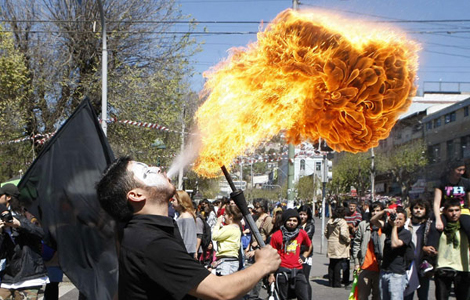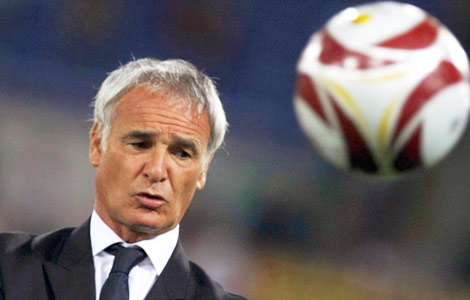Warnings mount on euro crisis, BRICS mull more aid
Updated: 2011-09-23 06:14
(Agencies)
|
|||||||||||
WASHINGTON/FRANKFURT - World leaders and finance chiefs demanded Europe act decisively to quell its debt crisis and big emerging economies said they would consider providing more money to help prevent the chaos from spreading.
As finance ministers and central bankers gathered for talks in Washington against a backdrop of plunging stock markets, the leaders of Australia, Canada, Indonesia, Britain, Mexico, South Africa and South Korea stressed the risk of the euro zone crisis spreading worldwide.
"Euro zone governments and institutions must act swiftly to resolve the euro crisis and all European economies must confront the debt overhang to prevent contagion to the wider global economy," the leaders wrote in an open letter to France, chair of the Group of 20 leading economies.
Separately, officials from the so-called BRICS countries, including heavyweights China, Brazil and India, said they would consider giving more funds to the International Monetary Fund to boost global stability.
But India warned it might not be able to spare much.
"We represent a group of countries where there is (an) enormous amount of demand for resources at home for poverty reduction," Reserve Bank of India Governor Duvvuri Subbarao told a joint BRICS news conference in Washington.
China's central bank governor, Zhou Xiaochuan, said major emerging markets should boost domestic demand as a means to take up some of the slack caused by weakness in the United States and Europe.
"Actually the BRICS countries represent quite a big share of the global economy. In today's crisis period, internal demand of each economy is important, and we should find a way to enlarge internal demand in our economy," Zhou said.
The BRICS finance ministers and central bank governors also prescribed tough medicine for Europe, the United States and other rich countries with high debts and big budget deficits.
As stock prices around the world fell on fears of a new economic slump, U.S. Treasury Secretary Timothy Geithner voiced optimism that Europe would "act with more force in the coming weeks and months."
U.S. President Barack Obama urged European leaders this week to take "forceful and decisive" action to confront current euro zone debt problems, his spokesman said.
The Financial Times reported European officials looked set to speed up plans to recapitalize the 16 banks that came close to failing last summer's pan-EU stress tests.
ECB warns euro in danger
A European Central Bank study on Thursday also warned the entire euro currency project was now in peril.
The study, perhaps the most stern warning about the euro's future from a central banker, was a parting shot from ECB chief economist Juergen Stark, who resigned this month after opposing the bank's purchases of troubled countries' bonds.
"Greatly increased fiscal imbalances in the euro area as a whole and the dire situation in individual member countries risk undermining stability, growth and employment, as well as the sustainability of (Europe's Economic and Monetary Union) itself," said the research paper, which was published by the ECB but not endorsed by it.
G20 finance ministers will meet for dinner in Washington on Thursday to discuss the crisis, but they have no plans to issue a communique to outline a response.
That may be disappoint investors already alarmed about the inability of policymakers to come together to tackle the world's economic problems as they did to fight the financial crisis of 2007-09.
World stocks plunged on Thursday as investors worried about the the grim global growth outlook including data pointing to a slowdown in China, one of the world's key economic engines.
European stocks fell over 4.5 percent and the Dow Jones Industrials were down over 3.5 percent.
Investors flooded into the safe haven of U.S. Treasury debt, pushing yields to new lows a day after the Federal Reserve announced a plan to shift its balance sheet to longer-dated paper to keep lending rates low and bolster the U.S. economy.
The European Union's monetary affairs commissioner, Olli Rehn, vowed European leaders would not allow an uncontrolled Greek default, nor would the country leave the euro zone.
Rehn did not rule out the possibility of a Greek debt restructuring, but said this would be difficult to do in an "orderly" way.
In Athens, Prime Minister George Papandreou said further austerity measures were vital to Greece, even as workers striking in protest shut down the country's transport system.
"There is no other path. The other path is bankruptcy, which would have heavy consequences for every household," he said after a meeting in parliament with deputies from his ruling Socialist party.
Banks in focus
The crisis has raised pressure on European banks, and particularly French lenders, which are heavily exposed to Greece and other troubled euro zone sovereigns.
The IMF has pressed for a recapitalization of European banks -- and has faced some opposition from bank executives and EU governments, who have argued balance sheets in the region are sound.
France's biggest bank, BNP Paribas denied a Reuters report that it was in talks with the Gulf state of Qatar on taking a stake in the bank.
French finance Minister Francois Baroin said any liquidity problems for euro zone banks were addressed by global central bank efforts to set up new liquidity facilities last week.
He said the euro zone's priority is "reducing deficits as quickly as possible." Leveraging Europe's bailout fund could be achieved at a later date to "give it more systemic firepower."
Hot Topics
Libya conflict, Gaddafi, Oil spill, Palace Museum scandal, Inflation, Japan's new PM, Trapped miners, Mooncake tax, Weekly photos, Hurricane Irene
Editor's Picks

|

|

|

|

|

|







